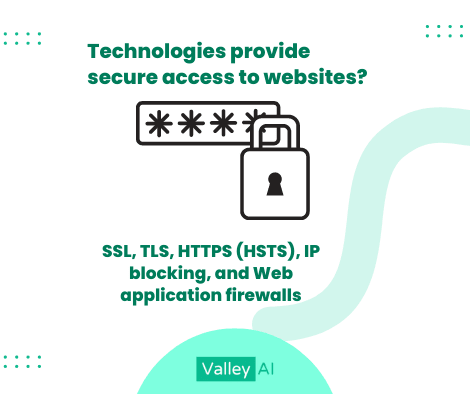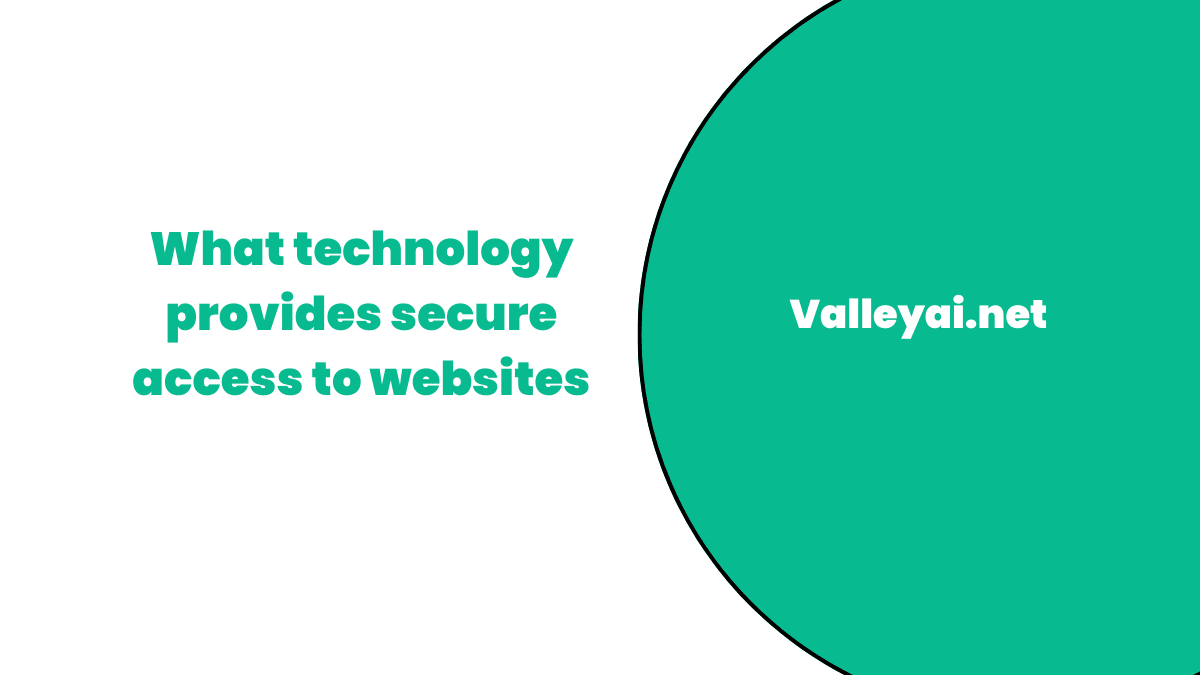Every website has a special web address called a URL (Uniform Resource Locator). It helps your internet browser find the website you want to visit. To make sure websites are easy and safe to access, there are lots of different technologies available. If you own a website, it’s not just about keeping it secure; you also need to make sure users can connect to it easily and that their experience is smooth.
This article is all about the technologies that make websites safe to visit. Let’s dive in and learn more about what technology provides secure access to websites!
Key Highlights
- HTTPS is the most commonly used secure access technology that ensures secure communication between users and websites.
- SSL and TLS are encryption protocols that provide an additional layer of security to websites.
- Virtual Private Networks (VPNs) offer secure access to websites by encrypting internet traffic and masking IP addresses.
- Multi-Factor Authentication (MFA) and Secure Web Gateways (SWGs) are advanced security measures that enhance website security.
- Dealing with emerging security threats and overcoming the limitations of traditional security solutions are key challenges in securing website access.
Understanding Secure Access Technologies

To make sure websites are safe to visit, it’s important to know about the different technologies that keep your information secure. These technologies create a protective layer to stop unauthorized access and keep your data safe as it travels between your device and the website’s server.
One of the most common technologies is HTTPS, which stands for Hypertext Transfer Protocol Secure. It combines regular HTTP with special encryption protocols like TLS or SSL. This encryption scrambles the data sent between your web browser and the website, making it unreadable to anyone trying to snoop.
By December 2022, more websites were using HTTPS. About 58.4% of the top websites had adopted it. This shows that more people are choosing secure browsing options.
TLS and SSL are like extra layers of protection. They create encrypted connections between your device and the website’s server, ensuring that nobody can listen in or tamper with your data. TLS is the newer and more secure version of SSL, making sure your information stays safe from prying eyes.
Web servers are like guardians of website security. They host websites and use technologies like HTTPS, TLS, and SSL protocols to encrypt data and make sure your conversations with the website are secure. Without these technologies, browsing the web wouldn’t be as safe and secure for users like you.
The Importance of Website Security
Keeping websites safe is super important in today’s digital world. There’s a lot of personal info floating around online, like passwords and financial details. If this info gets into the wrong hands, it can lead to some serious trouble, like identity theft or fraud.
That’s why website security is crucial. It’s like putting a lock on your front door to keep bad guys out. Technologies like HTTPS, TLS, and SSL are like super-strong locks for websites. They scramble your information so nobody else can understand it, making sure your chats with websites stay private and safe.
When website owners use these technologies, they’re like superheroes protecting your data. They make sure your info stays safe while you’re browsing the web. So, website owners need to keep up with the latest security measures and make sure their websites are super secure for you.
Common Types of Secure Website Access Technologies
There are different ways to keep websites safe for users. Some common ones are SSL (Secure Sockets Layer) and TLS (Transport Layer Security), which create secure connections between a website and your web browser. When you see a padlock icon in the URL bar, it means the website is using HTTPS, which is a super-safe way to chat with it.

Another cool technology is VPNs. They make online connections even safer by hiding your IP address and encrypting your data. It’s like sending secret messages that only you and the website can understand.
These technologies are like shields that protect website data from bad guys. Using them helps website owners make sure their websites are safe for users and keep their conversations private.
How HTTPS Enhances Website Security
HTTPS is like a super-strong lock that keeps websites safe for users. It uses special codes called TLS to create secure connections between web servers and browsers. This makes sure that your personal information, like passwords and credit card details, stays safe from sneaky hackers.
According to Wikipedia, Netscape Communications created HTTPS in 1994 for its Netscape Navigator web browser.
When a website uses HTTPS, it’s like getting a stamp of approval that it’s trustworthy. You’ll see a little padlock icon in the browser’s address bar, which means your chats with the website are super safe and secure.
The Role of SSL/TLS in HTTPS
SSL/TLS is like a bodyguard for HTTPS websites, making sure your chats with them stay safe and private. It creates a secret code between the website and your browser, scrambling your info so nobody else can understand it.
As SSL evolved into Transport Layer Security (TLS), HTTPS was formally specified by RFC 2818 in May 2000.
When you visit an HTTPS website, SSL/TLS makes sure your info is locked up tight and can’t be snooped on or messed with. It also checks that you’re talking to the real website and not a fake one trying to trick you.
Using SSL/TLS is super important for keeping your online chats secure and making sure your info stays safe from bad guys.
Recognizing HTTPS on Websites
When you’re on a website, it’s important to know if it’s safe to share your info. Look at the address bar in your web browser. If the website uses HTTPS, you’ll see a little padlock icon next to the web address, and the address itself will start with “https://” instead of “http://”.
These signs mean the website is super secure, like a fortress for your info. By keeping an eye out for these clues, you can make sure you’re only sharing your personal stuff on websites that will keep it safe.
The Functionality of Virtual Private Networks (VPNs)
VPNs are like secret tunnels that keep your internet connection safe and private. They hide your information from hackers by scrambling it into a code that only you and the website can understand.
VPNs also hide your IP address, which is like your online fingerprint. This makes it harder for anyone to track what you’re doing online. It is useful on public Wi-Fi or for accessing restricted content.
Using a VPN is like having a super-strong bodyguard for your internet connection. It keeps your information safe from sneaky hackers and makes sure your online activities stay private.
How VPNs Secure Online Connections
VPNs make your online connections safe by turning your data into secret codes using special tech like OpenVPN or IPsec. This keeps your info private and secure when you send it between your device and the website.
They also hide your IP address, which is like your online address. This makes it hard for anyone to spy on what you’re doing online.
Using a VPN is like having a secret tunnel that only you and the website can use. It’s super important for staying safe, especially when you’re using public Wi-Fi or sharing private info online.
VPNs vs. HTTPS: A Comparative Analysis
When comparing VPNs to HTTPS, it’s important to know what each does. VPNs create secret tunnels for all your online stuff, keeping it safe from snoops. HTTPS, on the other hand, just protects the chats between your browser and websites.
VPNs are like bodyguards for everything you do online, while HTTPS is more like a lock just for website chats. VPNs hide your IP address, but HTTPS makes sure the website you’re talking to is real.
So, if you want overall online safety, VPNs are the way to go. But if you just need to chat with websites securely, HTTPS does the job.
Advanced Security Measures
Using Multi-Factor Authentication (MFA) and Secure Web Gateways (SWGs) are super important for keeping web servers safe. MFA makes it harder for bad guys to get in by asking for extra info when you log in. SWGs watch over web traffic, making sure no sneaky threats get through.
When you use both MFA and SWGs together, it’s like having two layers of armor protecting your data. MFA makes sure only the right people can get in, while SWGs keep an eye out for any troublemakers trying to sneak in.
Using these security measures is crucial in today’s digital world to keep your info safe from hackers and other bad stuff.
Implementing Multi-Factor Authentication (MFA)
Multi-factor authentication (MFA) is a crucial security layer that enhances website protection significantly. By requiring users to provide multiple forms of verification to access their accounts, MFA mitigates the risks associated with stolen credentials or unauthorized access attempts.
This method typically combines something the user knows (like a password) with something they have (such as a smartphone for receiving a verification code) and something they are (like a fingerprint or facial recognition).
This multi-pronged approach makes it exponentially harder for attackers to breach user accounts, even if they manage to obtain one factor of authentication. Implementing MFA ensures that only authorized users with legitimate access can reach sensitive information on websites, bolstering overall cybersecurity defenses against a wide range of threats.
The Use of Secure Web Gateways (SWGs)
Secure Web Gateways (SWGs) are like guards that keep an eye on the internet for you. They make sure you don’t accidentally visit bad websites that could harm your computer. SWGs also check web content to make sure it’s safe and block anything that looks suspicious.
They have lots of features, like antivirus scanning and controlling what websites you can visit. Companies use SWGs to keep their data safe and make sure everyone follows the rules when browsing the web at work.
Using SWGs is a smart way to stay safe online and make sure your company’s network is protected from cyber threats.
Challenges in Securing Website Access
Securing websites can be tough because new cyber threats are always popping up, and old security methods might not be enough. Website owners need to keep a close watch on things to make sure user data stays safe. They have to keep updating their security systems and watching out for sneaky attackers who try to find vulnerabilities in how people log in.
Sometimes, traditional security tools aren’t enough to stop these advanced attacks. That’s why things like Secure Web Gateways (SWGs) and Multi-Factor Authentication (MFA) are important. It’s like building a strong fortress around your website to keep out all the cyber bad guys.
Protecting websites means using lots of different tools and always staying on guard against new threats.
Dealing with Emerging Security Threats
Keeping websites safe from new cyber threats is important. Hackers are always changing their tricks to find weaknesses in websites, like in the apps they use or how they send data.
To fight back, website owners need to use strong security tools like Multi-Factor Authentication (MFA) and Web Application Firewalls (WAFs). These tools add extra layers of protection and help you watch out for any suspicious activity.
It’s also crucial to keep everything up-to-date and pay attention to any new tricks hackers are using. By staying on top of things and being proactive, website owners can keep their users’ data safe and earn their trust.
Overcoming Limitations of Traditional Security Solutions
Keeping data safe from cyber threats is a big challenge for traditional security methods. That’s why many organizations are using new technologies like web application firewalls (WAFs) and virtual private networks (VPNs) to stay protected.
WAFs watch over the traffic coming to and from a website, making sure no bad stuff gets through. VPNs create secure connections over the internet, keeping data safe from prying eyes.
By using these new technologies, businesses can make sure their data stays safe from cyber bad guys. It’s also important for employees to learn about these threats and how to stay safe online.
Conclusion
To keep data safe and protect user privacy online, it’s important to use secure website technologies. Things like HTTPS, SSL/TLS, VPNs, MFA, and SWGs or Wildcard SSL help keep cyber threats at bay and make sure websites are safe to use.
By focusing on website security, businesses can earn the trust of their users and create a safe online space. It’s crucial to stay updated on new threats and keep improving security measures to stay ahead of potential risks. Using advanced security tools is the key to making sure everyone has a safe and reliable online experience.
FAQs About secure website access Technologies
What Makes HTTPS Crucial for Website Security?
HTTPS is really important for keeping websites safe. It encrypts the data that goes between a user’s browser and the website, making it hard for hackers to spy on sensitive information. It also checks to make sure the website is real, which keeps connections secure. HTTPS is crucial for stopping data breaches and making users feel safe.
Can VPNs Provide Complete Anonymity and Security Online?
VPNs make your online activity more private and secure by hiding your IP address and encrypting your internet traffic. But whether they give you total anonymity depends on the VPN service you use. It’s important to know what a VPN can and can’t do before you rely on it.
How Do SWGs Complement Other Security Technologies?
Secure Web Gateways (SWGs) make security systems stronger by filtering web traffic and enforcing rules. They team up with firewalls, antivirus programs, and intrusion detection systems to give full protection. SWGs add an extra shield against online threats, making security setups more robust.
- Understanding the Landscape of Cloud Vulnerability Management - March 25, 2024
- Quality Assurance Strategies for Startups: Ensuring Software Reliability - March 5, 2024
- Working of NLP to Improve Copywriting in AI Paraphrasing Tool - February 28, 2024

